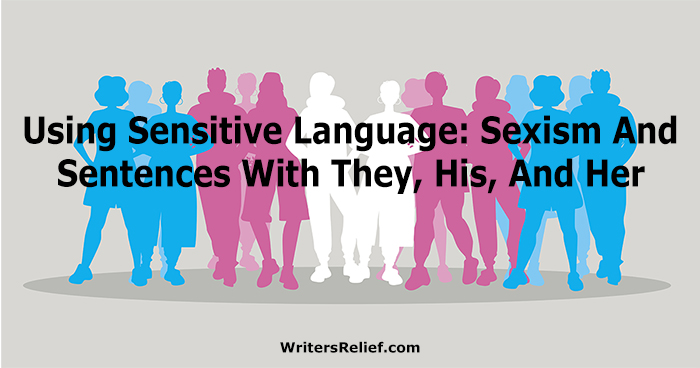
As society becomes more conscious of racism, sexism, ableism, homophobia, and transphobia, it’s important to choose words that do not unknowingly spread harmful ideas. Writer’s Relief has discussed the significance of gender-neutral language in writing, but it’s also important to be aware of other terms and expressions we use in our writing that might seem insensitive. Here’s how to use sensitive language in your writing.
Using Sensitive Language When Writing
Gender Bias and Singular “They”
When talking about a group of individuals where the gender of the group is established, it can be easier to understand the pronouns that would be used when discussing individual members of said group. For example:
During the all-girls school’s trip, every student was expected to write a journal entry of her favorite moment.
However, sometimes those assumptions might steer us wrong and lead us to sexist assumptions (a group of nurses will not always be all women) or merely be impossible to guess (a group of teachers could contain people of various genders).
In this case, what do you do?
At one time, grammarians would insist on using the phrase “his or her.” But nowadays that style of writing has been deemed unwieldy and also ignores those who might not use the pronouns she or he. As such, the use of his or her to refer to individuals in a group has fallen out of fashion. Instead, many style guides now recommend using the singular “they.”
As of 2019, most style guides—including the Chicago Manual of Style, the MLA Style Manual, and the APA Publication Manual—accept the usage of the singular they. The APA, the Merriam-Webster Dictionary, the Oxford English Dictionary, and the American Heritage Dictionary also support using the singular they for a person whose gender you don’t know.
A second-best option is to restructure your sentence so that it doesn’t mention individuals within a group.


Other Sensitive Areas
Race
It is extremely offensive to make sweeping generalities about an entire race or nationality, so be careful how you describe your characters, and avoid stereotypes of any kind. Consider how you describe your character and be careful comparing certain races to animals, hypersexualizing others, or exoticizing those who are unfamiliar.
Disability & Mental Health
It’s important to avoid the careless use of ableist language and tropes in writing, including words or phrases based on physical disabilities or neurodivergence. Words such as “dumb” and “lame” can be hurtful when used inappropriately.
Religion
This can be a very sensitive area. If you view a particular religion as fanatical or cultlike, refrain from describing it as such. Your readers could be mightily offended—and rightly so.
Sexuality
When writing about a person’s sexual orientation, be cautious about employing stereotypes. Humanity is vast and wonderfully varied. While there are those who might match certain aspects of common stereotypes, your reader might not appreciate it if, for example, you write about a queer person by only using textbook stereotypes.
Appearance
Some writers might describe a character as “fat” or “ugly” to imply repugnant personality traits. But in the spirit of using sensitive language, you shouldn’t make moral judgments about appearance. Someone who is slovenly shouldn’t automatically be described as overweight, just as attractiveness shouldn’t be treated as a guarantee of niceness or goodness.
Of course, there is an exception to these guidelines. If you’re trying to show that a person is narrow-minded and insensitive, you might have them using offensive words and phrases. Just make sure it’s clear that it is the character who is insensitive—not you, the writer.
When you’ve carefully proofread, edited, and checked your work for any accidental inclusion of insensitive language, it’s time to submit it for publication! The research experts at Writer’s Relief can pinpoint the best markets for your writing and boost your odds of getting an acceptance. Learn more about our services, and submit your work to our Review Board today!
Whether you want to take the traditional publishing route or are thinking about self-publishing, we can help. Give us a call, and we will point you in the right direction!
Question: How might you avoid using insensitive language when describing a character?



















I have used “they” and “their” in references to the singular for years and it has nothing to do with the current culture. I believe the flow relates better with their use than he/she.
Thank you, Steve!